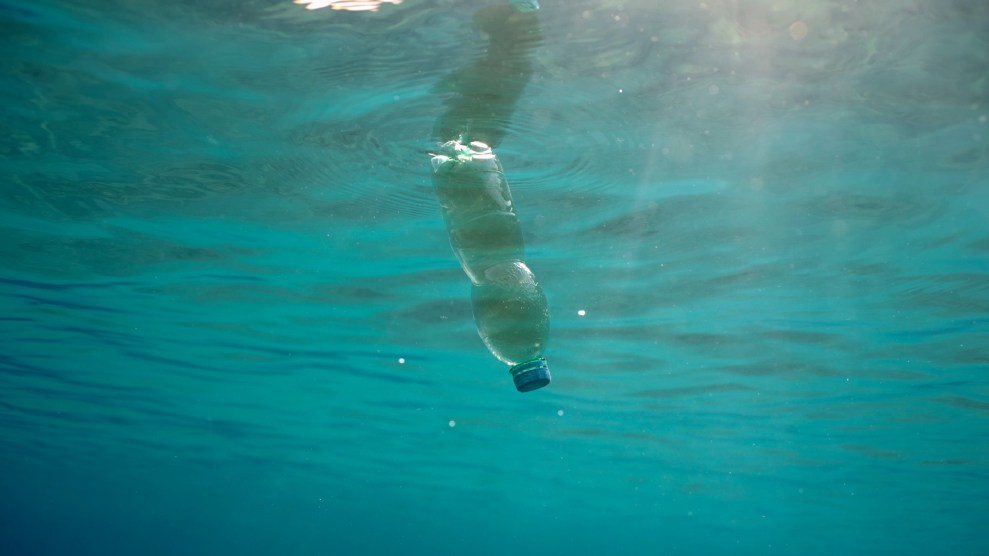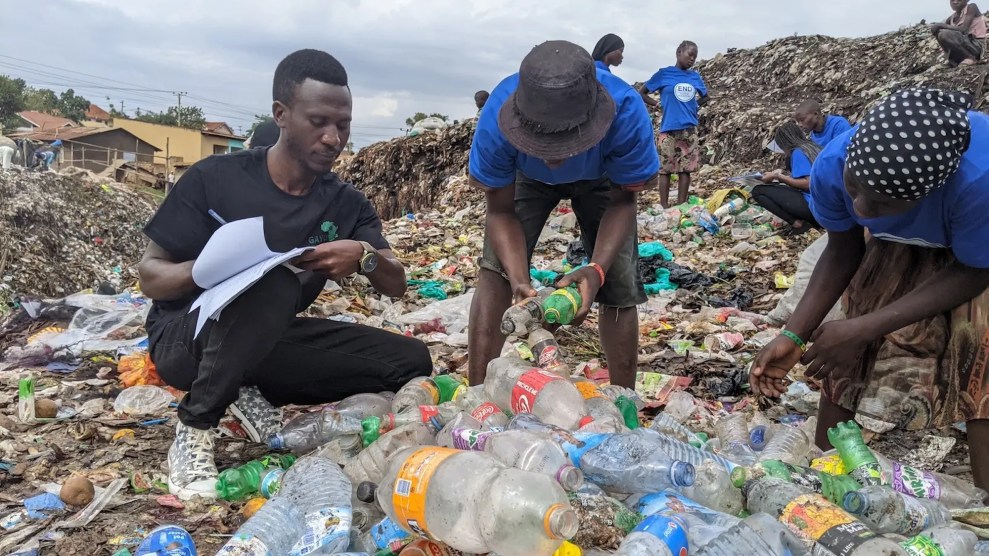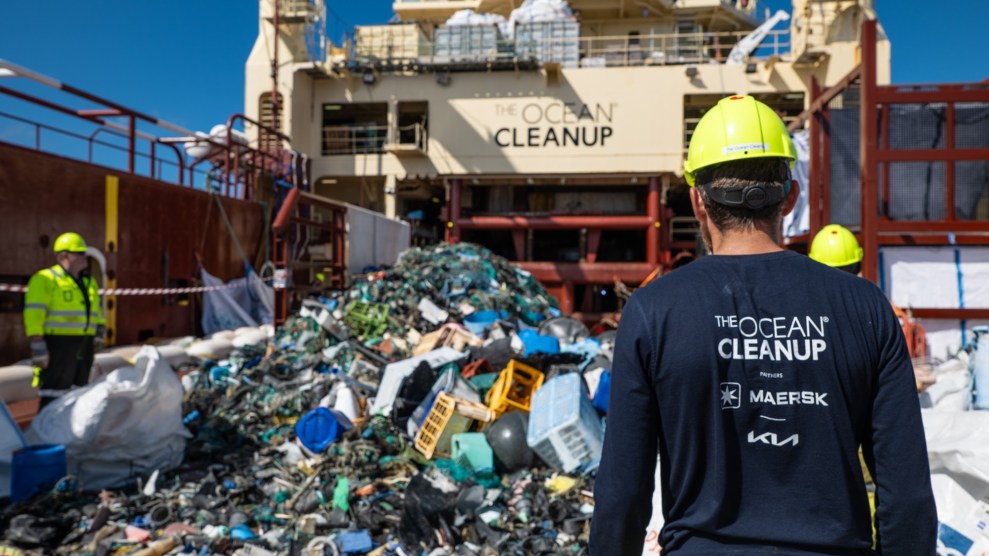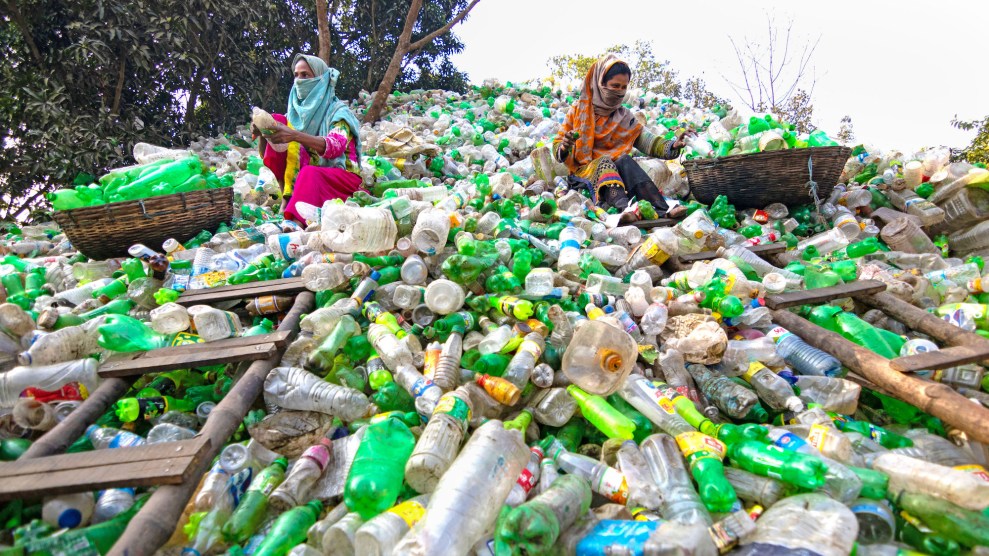
According to a recent study, plastic producers may have broken multiple laws.Andrey Nekrasov/ZUMA
This story was originally published by the Guardian and is reproduced here as part of the Climate Desk collaboration.
Companies have spent decades obstructing efforts to take on the plastics crisis and may have breached a host of US laws, a new report argues.
The research from the Center for International Environmental Law (CIEL) details the widespread burdens that plastic pollution places on US cities and states and argues that plastic producers may be breaking public nuisance, product-liability, and consumer-protection laws.
It comes as cities such as Baltimore have begun to file claims against plastic manufacturers, but the authors write that existing cases “are likely only the beginning, as more states and municipalities grapple with the challenges of accumulating plastic waste and microplastics contamination.”
Taxpayers foot the bill to clean plastic pollution from streets and waterways, and research shows people could ingest the equivalent of one credit card’s worth of plastic per week.
“We’re in the midst of a population-scale human experiment on the impacts of multigenerational toxic exposures,” said Carroll Muffett, president of CIEL and a report co-author. “Plastics are at the epicenter of that.”
“We’re in the midst of a population-scale human experiment on the impacts of multigenerational toxic exposures. Plastics are at the epicenter of that.”
Drawing on newly revealed internal documents and previous investigations, the authors write that producers knew of these risks and produced and marketed plastics anyway.
Petrochemical producers such as ExxonMobil Chemical and Shell Polymers, and disposable plastic goods producers like Coca-Cola, PepsiCo, and Unilever, should be held responsible, they say.
Global plastics production exploded shortly after the Second World War, when “an industry that had been producing plastics primarily for military purposes needed new markets,” said Muffett.
From 1950 to 2000, global plastic production soared from 2 million tons to 234 million tons annually. And over the next 20 years, production more than doubled to 460 million tons in 2019, the authors write, citing data from the Organisation for Economic Co-operation and Development (OECD). But plastics producers knew in the 1950s that their products don’t break down and in 1969, documents show, industry interests discussed plastics accumulating in the environment but kept marketing them.
As the public grew concerned about plastic pollution, the industry responded with “sophisticated marketing campaigns” to shift blame from producers to consumers—for instance, by popularizing the term litterbug.
In the 1980s, the industry “misled the public” by lobbying states to adopt a plastic-packaging numbering system that resembled the “chasing arrows” recycling symbol and therefore appeared to indicate recyclability. (The Federal Trade Commission is currently re-evaluating the use of the symbols.)
Around that same time, some municipalities began attempting to curb plastic pollution.
Coordinated pushback
In 1989, Massachusetts considered banning all single-use packaging. The ballot initiative, proposed by the Massachusetts Public Interest Research Group, “had teeth to ensure compliance” including potential fines, jail time, and the possibility of civil-enforcement actions.
The ban was set to appear on the 1990 ballot, but the industry devised a “highly coordinated and sophisticated campaign” to kill it, the authors write based on internal documents.
“Despite being local in its scope, the Massachusetts ban represented a serious threat to plastics producers and a host of other industry interests,” the report says.
From 1950 to 2000, global plastic production soared from 2 million tons to 234 million tons annually. And over the next 20 years, production more than doubled to 460 million tons in 2019, the authors write.
Tobacco lawyers, whose industry had come under fire for littered plastic cigarette butts, lobbied the Massachusetts attorney general to shut down the measure. And, consumer goods producers like Procter & Gamble, petrochemical trade groups like the Chemical Manufacturers Association (which later became the American Chemistry Council), and tobacco lobby group the Tobacco Institute, created a task force to direct opposition.
The Council for Solid Waste Solutions (CSWS), an industry group funded by major petrochemical producers such as Exxon, Dow, DuPont, and Chevron, hired consultants to develop a plan for opposing legislative bans.
CSWS also facilitated the creation of a “front group”, which purported to represent local business interests. And it lobbied state lawmakers to water down the measure, promoting recycling instead of packaging bans.
Another strategy: pitting environmentalists and organized labor against one another. CSWS recruited members of the Massachusetts AFL-CIO to oppose the measure at hearings. Soon after, the labor organization passed a resolution opposing the ban. (The Tobacco Institute took credit for the success of the “labor resolution process,” writing in a document: “Labor and consumer groups are natural allies to environmental organizations; however, efforts are underway to diffuse such alliances on this issue.”)
CSWS also sued to invalidate the measure on a technicality, arguing that because the petition’s signatures and text did not appear on the same page, the signatories may not have reviewed the proposal. This was ultimately successful on appeal; within months, the ballot initiative was dead.
The industry also successfully fended off a similar ballot initiative in Oregon, the report says. And politicians in Oregon, California, and Wisconsin introduced a bill drafted by the right wing think tank American Legislative Exchange Council promoting recycling over packaging bans.
Plastic interests appear to be using similar tactics today. Using Facebook’s advertising database, the researchers found that the petrochemical trade group the American Chemistry Council had run $10m worth of seemingly local ads in US states in recent years encouraging people to contact local officials to oppose anti-plastic measures and support for so-called advanced recycling, which breaks plastic polymers down but is energy-intensive and creates pollution.
Ross Eisenberg, president of America’s Plastic Makers, part of the American Chemistry Council, called the research a “misdirected distraction” from the resources the industry is putting into preventing pollution and said it ignored “the environmental benefits of plastics,” citing a McKinsey study that environmentalists have contested.
Legal theories
The effects of this deception and plastic pollution are widespread, the report argues. Plastic has clogged sewer grates, leading to increased flooding, while also forcing municipalities to invest in expensive skimmers to remove materials from waterways. It has also exposed populations to microplastics, which studies show are pervasive and which researchers believe to be harmful.
The report outlines different legal theories that could help governments pursue accountability for these harms. Nuisance could account for the harms themselves, product liability could put companies on the hook for damage caused by poor design, and consumer-protection law could be used to combat deceitful marketing practices.
Existing lawsuits have made use of these theories. Baltimore sued six plastic companies this month and filed a similar suit against cigarette manufacturers for littered plastic cigarette filters. New York in 2023 also filed a case against PepsiCo. But the damages are more widespread than these suits indicate, the authors say.
Other attempts at accountability are underway. In California, a two-year-old investigation by the attorney general, Rob Bonta, into the plastics industry and its communication about recycling could potentially result in a case against oil interests.
A February report from the Center for Climate Integrity (CCI) found that companies knew for decades that plastic recycling is not feasible, but promoted it anyway. Both reports add to a “growing body of evidence” showing the plastics crisis was “created and perpetuated by a decades-long campaign of deception,” said Alyssa Johl, CCI vice president.
Brian Frosh, former attorney general for Maryland, who reviewed both reports, said if currently an attorney general, he would be actively pursuing legal action.
“This is a crisis that’s been imposed on the public and one that needs redress,” he said.

















